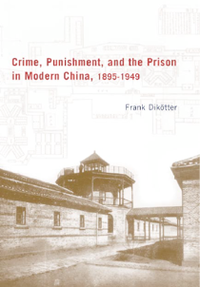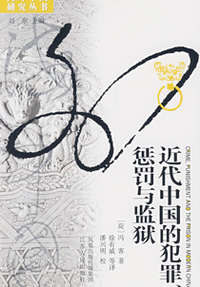'This is an excellent book, simultaneously meticulous and passionate.' - Bradley Winterton, Times Literary Supplement
'Dikötter bases his meticulously researched study on an abundance of hitherto unseen materials from recently opened prison archives and on several provincial and municipal archives... a richly detailed narrative.' - Zvi Ben-Dor, Journal of Asian Studies
'An impressive display of scholarship... Dikötter succeeds in weaving together wide-ranging texts and archival sources into a forceful demonstration of the persistence of cultural constructs and the ways in which these shaped the Republican-era project of modernization.' Bradly Reed, also Journal of Asian Studies
'Thanks to painstaking work in the archives, Dikötter is able to usher the reader into the Chinese prison.' American Historical Review
'Although not always acknowledged as one of those institutions, the prison is a central part of the way in which the modern nation-state has created legitimacy and authority. Frank Dikötter has produced a path-breaking, ambitious book which explores these issues in early twentieth-century China. This book succeeds on many levels... the fascinating story explored by Dikötter in this books deserves an audience beyond just historians of modern China or of penology.' - Rana Mitter, Pacific Affairs
'Professor Dikötter has writte a powerful, enlightening and quite readable book. Each of the four themes that form the thrust of the book, crime, punishment, prisons and modern China, is inescapably diffuse. Yet using the deft hand of the comparatives, the author weaves a meaningful whole from them... The book is built on a foundation of powerful sources. At each stop Dikötter carefully work through his sources, juxtaposes seemingly disparate ideas, and comes up with genuinely engaging conclusions… Professor Dikötter also writes clear, readable prose… [The book] is a well-built vehicle for a journey through tumultuous times and thorny topics.' – Robert C. Berring, Punishment and Society
'This is a work of remarkable scholarship, based on a no less impressive analysis of sources as little known as the municipal archives in Peking or the provincial archives in Liaoning province on the penal administration of the early years of Republican China. In it, Frank Dikötter takes us, between 1895 and 1949, to the deepest recesses of a world of incarceration founded on a modern understanding of the philosophy of punishment. ' – Leila Choukroune, China Perspectives
'Dikötter relies on materials gleaned from prison archives... yet the materials also contain fascinating and revealing accounts of aspirations expressed, obstacles encountered, and countless sufferings endured. While, in some sense, this is a highly specialized volume dealing with a somewhat narrow subject, there is also a great deal of material here that touches on broader philosophical, social, and political issues of the period, and Dikötter is adept at bringing these out.' - Gene Cooper, Journal of the Royal Anthropological Institute
'This important book will be invaluable to all who seek to understand the many dimensions of legal reform in China.' - Pitman Potter, International History Review
'Dikötter has written an important and impressive book that deserves to be read by a broad public.' - Břrge Bakken, China Journal
'Dikötter writes in a clear, vivid, jargon-free style that makes government documents come to life, providing fascinating details of life behind bars, while maintaining the larger picture of nationalism and cultural development. Altogether, Crime, punishment and the prison in modern China is a brilliant study that fills an important niche in the literature on the origins and development of prisons.' - Robert P. Weiss, Asian Studies Review

